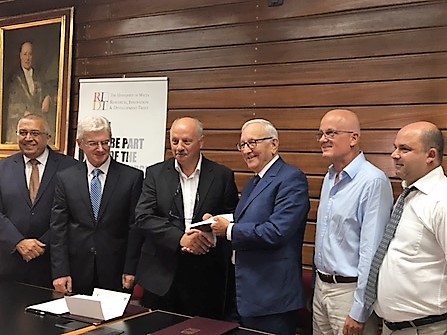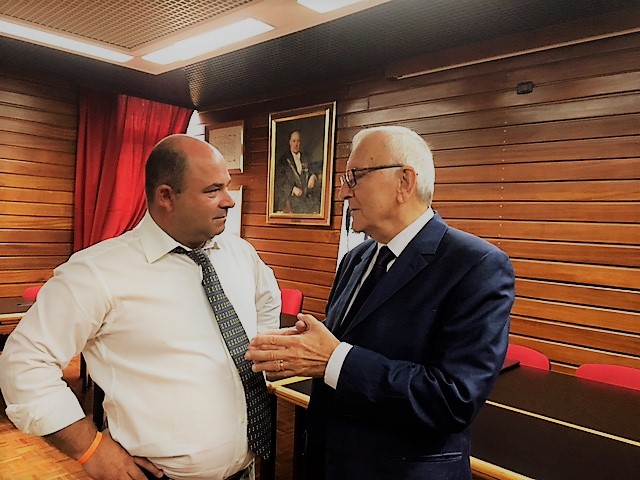
The Alfred Mizzi Foundation, the University of Malta and the RIDT have signed an agreement through which the Foundation will be financing a research project related to strokes. The donation amounts to €150,000, and is the largest single donation since the setting up of the RIDT.
The signatories of the Agreement were University of Malta Rector, Prof. Alfred Vella, Mr Mario Grech and Mr Charles Zammit on behalf of RIDT and Mr Derek Vella on behalf of the Alfred Mizzi Foundation (Chairman). The signing took place in the presence of Mr Chris Briffa, Trustee of TAMF, Prof. Mario Valentino and Prof. Richard Muscat, both involved in the research project, and Mr Wilfred Kenely on behalf of the RIDT.
The Project deals with the ‘Sensory Stimulation as a Novel Treatment Strategy to Salvage the Brain during a Stroke’. The Research Team consists of Prof M.Valentino (lead), Dr. C. Zammit, Dr J. Vella, Mr R. Zammit and Prof. R. Muscat.
Despite major advances in prevention and rehabilitation, few neurological injuries are as debilitating as stroke. The disease is currently the third leading cause of death and the leading cause of long-term disability worldwide. It is similarly devastating in Malta. Old age is associated with an enhanced susceptibility to stroke, and with the increasing average age of the population, the already staggering numbers are likely to grow. The magnitude of the problem on pre-term babies is equally extraordinary and the main cause of cerebral palsy, the most common neurological disorder of infancy. According to the latest WHO data published in May 2014, 132 men and 102 women per 100,000 died from strokes in Malta in 2011, which means that stroke was the third most common cause of death in men and the second most common in women, reaching 10.41% of total deaths. Stroke is also the most common cause of severe disability in Malta with 1 in 4 men and 1 in 5 women expected to have a stroke by age 85.
Unfortunately, current options for acute treatment are extremely limited and there is an urgent need for new treatment strategies. Emerging new research shows strong evidence that mild sensory stimulation can completely protect the jeopardized brain from an impending stroke in a rodent model. When delivered within the first 2 hours following stroke, this stimulation resulted in complete protection, including a full reestablishment of cortical function, sensorimotor capabilities, and blood flow.
This recent breakthrough suggests a new, exciting potential avenue for the development of acute stroke treatment strategies that may produce a noninvasive, drug-free, equipment-free, and side effect–free means of protection from ischemic stroke. In this novel research, the scientists at the University of Malta intend to explore the cellular and molecular mechanisms of the time-sensitive events that underlie this protection. Such an understanding could lead to the development of drugs that imitate the protective effect of sensory stimulation.

Prof Mario Valentino with Mr Derek Vella, chairman of the Alfred Mizzi Foundation
The research being undertaken in the University of Malta laboratories is cutting-edge and unique in Europe. For the first time the researchers can capture 3-D cellular and molecular events deep down into brain structure to study how cells communicate, develop, and how injury and reconstruction occurs under high spatial resolution. From a broader perspective, the researchers also aim to raise more public awareness by promoting a campaign on the importance of recognizing the early signs of stroke, its risk factors and preventative measures, because the longer the delay for evaluation and treatment, the more likely the damage will be irreversible and the higher the chances that the patient will die or experience severe disability.
This project aims to help around 400 people a year who suffer a stroke in Malta. The project aims to help 70% of stroke survivors who suffer from severe disability, as well as the rest who require assistance with self-care.
To achieve its goals, this ambitious research requires significant funding. To date, the research group has benefitted from European structural funds for some equipment. Further funds will be used for the purchase of antibodies, drugs, dyes, equipment upgrades and the public awareness campaign in the form of school visits and talks in partnership with local stakeholders. This research is expected to advance understanding and treatment of vascular diseases in human subjects and assist work in the pursuit of excellence.
